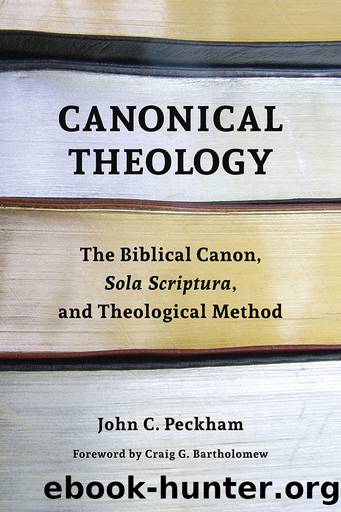Canonical Theology by John Peckham

Author:John Peckham
Language: eng
Format: epub
Publisher: Eerdmans
1. Philip Blosser, âWhat Are the Philosophical and Practical Problems with Sola Scriptura?â in Not by Scripture Alone: A Catholic Critique of the Protestant Doctrine of Sola Scriptura, ed. Robert A. Sungenis (Santa Barbara: Queenship, 1997), 50.
2. This working model is restricted to the meaning of sola Scriptura for theological method rather than the related issues of how sola Scriptura relates to ecclesial authority within the church (e.g., church discipline, intrachurch authority of clergy, etc.).
3. âInfallibleâ here means that Scripture is unfailingly accurate with regard to all that it affirms. Intrinsic to the infallibility of Scripture is the belief that divine revelation was accurately inscripturated via divine inspiration â âGod-breathedâ (cf. 2 Tim 3:16; 2 Pet 1:20-21). For a model of revelationâinspiration attentive to the doctrine and phenomena of Scripture, see Fernando Canale, Back to RevelationâInspiration: Searching for the Cognitive Foundation of Christian Theology in a Postmodern World (Lanham, MD: University Press of America, 2001).
4. Each of these corollaries is canonically derived. The application of 2 Tim 3:16 as representative of tota Scriptura presupposes the correct identification of the scope of Scripture (i.e., canon) and suggests that, although the NT Scriptures were still in the process of writing when this verse was written, Paulâs affirmation of existing Scripture in this instance lends itself to an application of all Scripture that can be correctly identified as such (cf. 1 Tim 5:18; 2 Pet 3:16, and the discussion in chapter 2).
5. I distinguish private interpretation, which purports to exclude all other factors and thus results in isolationism, from individual interpretation, which does not attempt to interpret Scripture in isolation from the community but recognizes that each individualâs interpretation cannot be bypassed.
6. Accordingly, sola Scriptura does not suggest that only the Bible should be read but advocates the full development of oneâs mind in accordance with biblical principles, learning from and engaging the best scholarship without âuncritical absorptionâ; see Anthony N. S. Lane, âSola Scriptura? Making Sense of a Post-Reformation Slogan,â in A Pathway into the Holy Scripture, ed. P. E. Satterthwaite and David F. Wright (Grand Rapids: Eerdmans, 1994), 302.
7. Regarding general revelation, this approach holds that nature, properly understood, does not contradict Scripture (Ps 19:1-6). At the same time, post-Fall nature includes much that does not reveal God (Gen 3:17-18; Rom 8:20).
8. God (Father, Son, and Spirit) is the living source of infallible revelation, from whom the authority of Scripture derives. Yet the Spirit does not supersede Scripture. Believers are to âtest the spiritsâ (1 John 4:1) and thus the Spirit-inspired canon functions as the collectively available standard by which all other factors may be measured.
9. Craig D. Allert, âWhat Are We Trying to Conserve? Evangelicalism and Sola Scriptura,â EvQ 76/4 (2004): 347.
10. As John Frame, âIn Defense of Something Close to Biblicism: Reflections on Sola Scriptura and History in Theological Method,â WTJ 59 (1997): 275, states, an idea âmay be based on a general principle rather than a specific textâ but should nevertheless be able to âbe shown to be exemplified in particular texts.
Download
This site does not store any files on its server. We only index and link to content provided by other sites. Please contact the content providers to delete copyright contents if any and email us, we'll remove relevant links or contents immediately.
The Five People You Meet in Heaven by Mitch Albom(3569)
The Secret Power of Speaking God's Word by Joyce Meyer(3220)
Real Sex by Lauren F. Winner(3023)
Name Book, The: Over 10,000 Names--Their Meanings, Origins, and Spiritual Significance by Astoria Dorothy(2987)
The Holy Spirit by Billy Graham(2953)
0041152001443424520 .pdf by Unknown(2846)
How The Mind Works by Steven Pinker(2816)
ESV Study Bible by Crossway(2778)
Ancient Worlds by Michael Scott(2688)
Churchill by Paul Johnson(2587)
The Meaning of the Library by unknow(2572)
The ESV Study Bible by Crossway Bibles(2551)
The Gnostic Gospels by Pagels Elaine(2531)
MOSES THE EGYPTIAN by Jan Assmann(2417)
Jesus by Paul Johnson(2363)
City of Stairs by Robert Jackson Bennett(2354)
The Complete Dead Sea Scrolls in English (7th Edition) (Penguin Classics) by Geza Vermes(2283)
The Nativity by Geza Vermes(2230)
Ancient Near Eastern Thought and the Old Testament by John H. Walton(2226)
